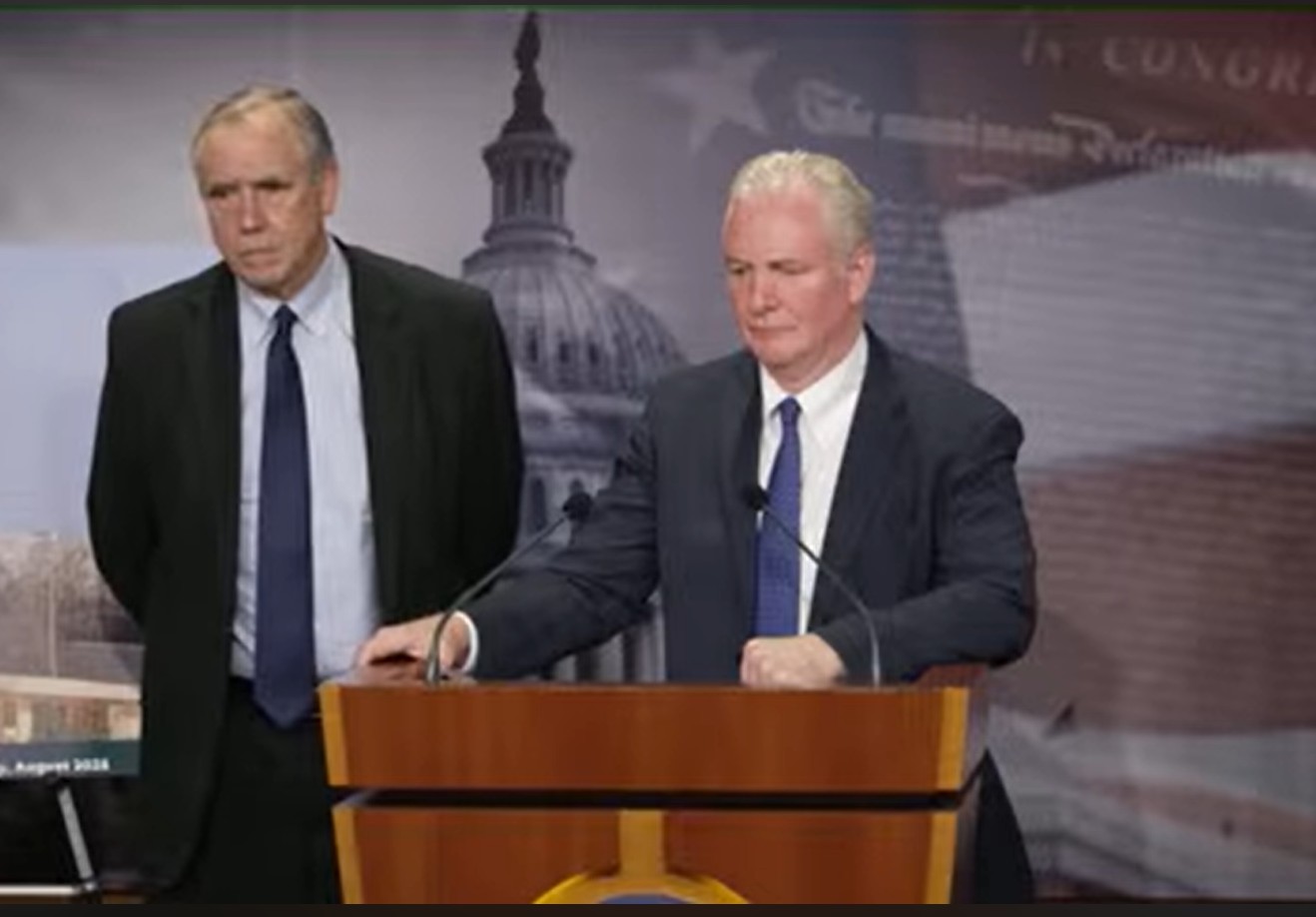Gaza Humanitarian Food Aid – A Report by Senators Van Hollen & Merkley

A detailed report by U.S. Senators Chris Van Hollen (Maryland) and Jeff Merkley (Oregon) resulting from a fact-finding CODEL mission to Israel, Gaza’s border, the West Bank, Jordan, and Egypt is a review of their observations of destruction and forced displacement. (Van Hollen, Merkley Report Following 2025 CODEL to Gaza Border, Israel, West Bank, Jordan, and Egypt, released Sept 11, 2025)
The two Senators begin their report observing that “In Israel, we met with families whose loved ones were taken hostage during Hamas’s heinous terrorist attack on Israel on October 7, 2023. We also returned to Kfar Aza, an Israeli kibbutz near the border with Gaza that we had previously visited in the summer of 2023. What we remembered as a vibrant community had become the site of one of the worst massacres on October 7th, with 80 people killed and 19 taken hostage.”
The Senators assert that U.S. complicity and international inaction have enabled a humanitarian crisis as a form of collective punishment against Palestinians. The Senators’ analysis is that collective punishment has replaced Israel’s initial military goal of defeating Hamas, extending suffering to the civilian population through the destruction of homes, hospitals, schools, and essential services: 92% of homes, 92% of schools, 94% of hospitals, and 86% of water/sanitation facilities have been destroyed or rendered unusable.
The report argues that Israel’s strategy combines the systematic devastation of Gaza’s civilian infrastructure—over 90% of homes, schools, hospitals, and water systems destroyed—with the weaponization of food and aid to render Gaza uninhabitable.
The authors observe that over 87% of Gaza’s territory is under military zones or evacuation orders, especially Gaza City where food access is minimal.
The Senators reference warnings of famine and that 132,000 children under five are at risk of food insecurity. NGOs reported instances of “starvation ketoacidosis”, an indication of weight loss. As a result of patchy distribution of aid, northern Gaza appears to have more children who are malnourished than southern Gaza.
1.9 million people (90% of Gaza’s population) have been displaced, many multiple times.
Much of the Senators’ report is about the tight delivery of limited aid from outside Gaza. Israel’s rejection of UNRWA’s role in aid delivery left 6,000 trucks of food and medicine warehoused and at risk of expiry. They criticize Israel’s restrictions on entry points, permitting only Kerem Shalom and Zikim to operate irregularly, while Rafah remains closed. The Jordan Corridor and Egypt aid crossing routes face high rejection rates (e.g., 68% for Egypt in August 2025), delaying non-food essentials like shelter and medicine, which disproportionately affect displaced families and the elderly ahead of winter.
Meanwhile, new customs and screening rules at Ashdod Port and along the Jordan Corridor drastically slowed aid shipments, reducing throughput to less than 10% of capacity. Drawing on interviews with the World Food Programme (WFP): “We were told by WFP officials that following the resumption of aid delivery to Gaza after the blockade was lifted, the Israeli government changed its screening practices and customs policies, resulting in the deliberate and unnecessary slowdown of the flow of food into Gaza. WFP is only able to screen between 20 to 30 containers a day, whereas before these new requirements were put in place, they were able to screen over a hundred a day. The new screening procedures take about 3 to 5 hours per container, and they must physically check each pallet inside the container before the whole container is cleared.”
The authors expressed concern that new lead aid agency, the Gaza Humanitarian Foundation (GHF), operates only four distribution sites, primarily in southern Gaza Established on May 26, 2025, amid the blockade’s end, the GHF replaced the UN’s extensive network with just four sites (three in southern Gaza, none in the north), leading to deadly chaos. Over 1,300 Palestinians have reportedly been killed near these sites amid chaotic food distributions. Doctors Without Borders (MSF) called this “orchestrated killing,” with 1,380 casualties (including 174 gunshot wounds to women and children) treated at nearby clinics over seven weeks.
Van Hollen and Merkley write that the current method of aid distribution has devolved into “the rule of the strongest,” where only the most physically able individuals can access assistance.
Israeli authorities have not protected humanitarian convoys from settler attacks, while bureaucratic barriers, including arbitrary “security concerns” and banned “dual-use” lists—further impede deliveries. Items such as water filters, tents, and even peanut butter have been prohibited. The report notes that there are “two sets of laws” for aid delivery at the Kerem Shalom crossing, with GHF trucks having access to a paved, orderly loading platform while UN trucks must use uneven dirt and gravel, making their cargo less secure. Further, they report, “One of the major problems since the start of the war in Gaza has been that the Israeli government has never published, nor provided to humanitarian organizations, a definitive list of what items are permitted or prohibited. Humanitarian groups we met with on the ground stressed that this lack of transparency has created enormous uncertainty and delays.”
Report Recommendations
The Senators call for:
- An immediate ceasefire by both warring factions and hostage release by Hamas.
- Unrestricted humanitarian access, including increasing the crossings in Kerem Shalom, Zikim, Kissufim, Gate 96, Rafah. They recommend aid agencies flood Gaza with sufficient humanitarian assistance to restore orderly distributions and lower prices, urgently address shelter needs before winter, and focus on protecting vulnerable populations.
- Protection of aid workers and journalists, working inside Gaza. Allow international journalists unfettered access to Gaza to provide independent verification and reporting on conditions; at the same time, push back politically and diplomatically against attempts to dismantle, deregister, or muzzle humanitarian and human rights organizations working in Gaza.
For the full report, see: www.vanhollen.senate.gov/imo/media/doc/van_hollen_merkley_report_following_2025_codel_to_gaza_border_israel_west_bank_jordan_and_egypt.pdf
Their press presentation can be seen at: https://www.youtube.com/watch?v=qQBx9SDi2wU
by Steve Hansch, Hunter Notes, Editor, WHES Board





